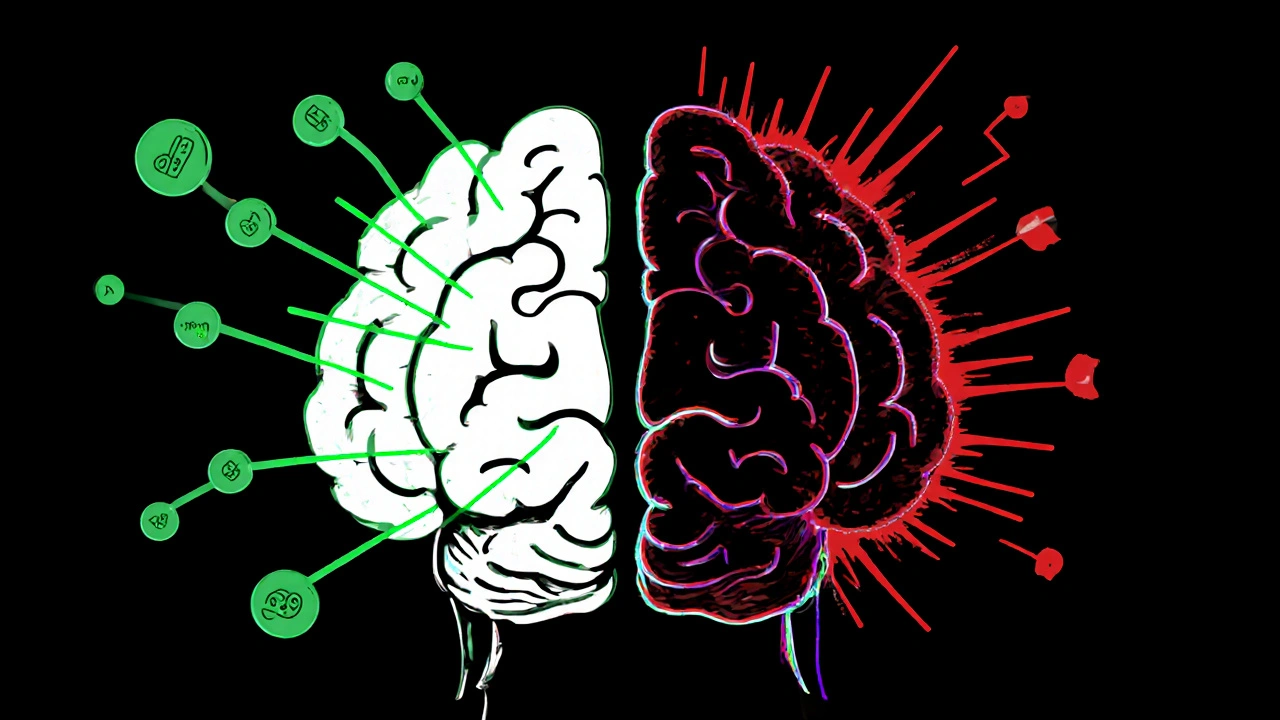
Alcohol dependence syndrome isn’t just about drinking too much. It’s when your body and brain start to need alcohol to feel normal - and when stopping feels impossible without serious consequences. This isn’t weakness. It’s a medical condition rooted in brain chemistry, genetics, and repeated exposure. If you or someone you know is struggling to cut back, even when it’s hurting relationships, health, or work, it’s not a choice - it’s a syndrome.
What Exactly Is Alcohol Dependence Syndrome?
Alcohol dependence syndrome is the clinical term for what many call alcoholism. It’s a chronic brain disorder where the body adapts to regular alcohol use to the point where it can’t function properly without it. The World Health Organization classifies it under alcohol use disorder (a medical condition characterized by impaired control over drinking, preoccupation with alcohol, continued use despite harm, and withdrawal symptoms). It’s not about how often you drink, or how much - it’s about what happens when you try to stop.
People with this syndrome don’t always drink daily. Some go weeks without, then binge. Others sip steadily all day. The common thread? When they don’t drink, their body reacts. Tremors. Anxiety. Sweating. Even seizures. That’s not craving - that’s physical dependence.
How Does Alcohol Rewire Your Brain?
Your brain uses chemicals called neurotransmitters to send messages. Alcohol boosts GABA, the brain’s main calming signal, and suppresses glutamate, the main excitatory one. Over time, your brain gets used to this chemical imbalance. It starts making less GABA and more glutamate just to stay balanced.
Now, when you stop drinking, your brain is stuck in overdrive. No alcohol means no GABA boost - and too much glutamate. That’s why withdrawal feels like your nervous system is screaming. Your heart races. Your hands shake. You can’t sleep. In severe cases, you might hallucinate or have seizures. This isn’t drama - it’s neurochemistry gone wrong.
Studies show that long-term heavy drinkers can have up to 40% fewer GABA receptors than non-drinkers. That’s not reversible overnight. Recovery takes months, sometimes years, for the brain to relearn how to function without alcohol.
Physical Symptoms: What Your Body Tells You
If you’re dependent, your body will let you know - often in painful ways. These symptoms don’t show up because you’re lazy or weak. They show up because your nervous system is in crisis.
- Tremors - Shaky hands, especially in the morning. Often called ‘the morning shakes,’ this is one of the earliest signs.
- Sweating - Drenching night sweats or sudden hot flashes without exertion.
- Nausea and vomiting - Not from a bad meal, but from your gut reacting to alcohol withdrawal.
- Insomnia - You may sleep for hours but wake up feeling exhausted. Sleep architecture is permanently disrupted.
- Increased heart rate - Your pulse might jump to 100+ bpm even at rest.
- Seizures - These can occur 6-48 hours after the last drink. They’re dangerous and require emergency care.
- Delirium tremens (DTs) - The most severe form. Confusion, hallucinations, high fever, and extreme agitation. Up to 5% of untreated cases are fatal.
These aren’t side effects. They’re withdrawal symptoms - the body screaming for the substance it’s been forced to rely on.
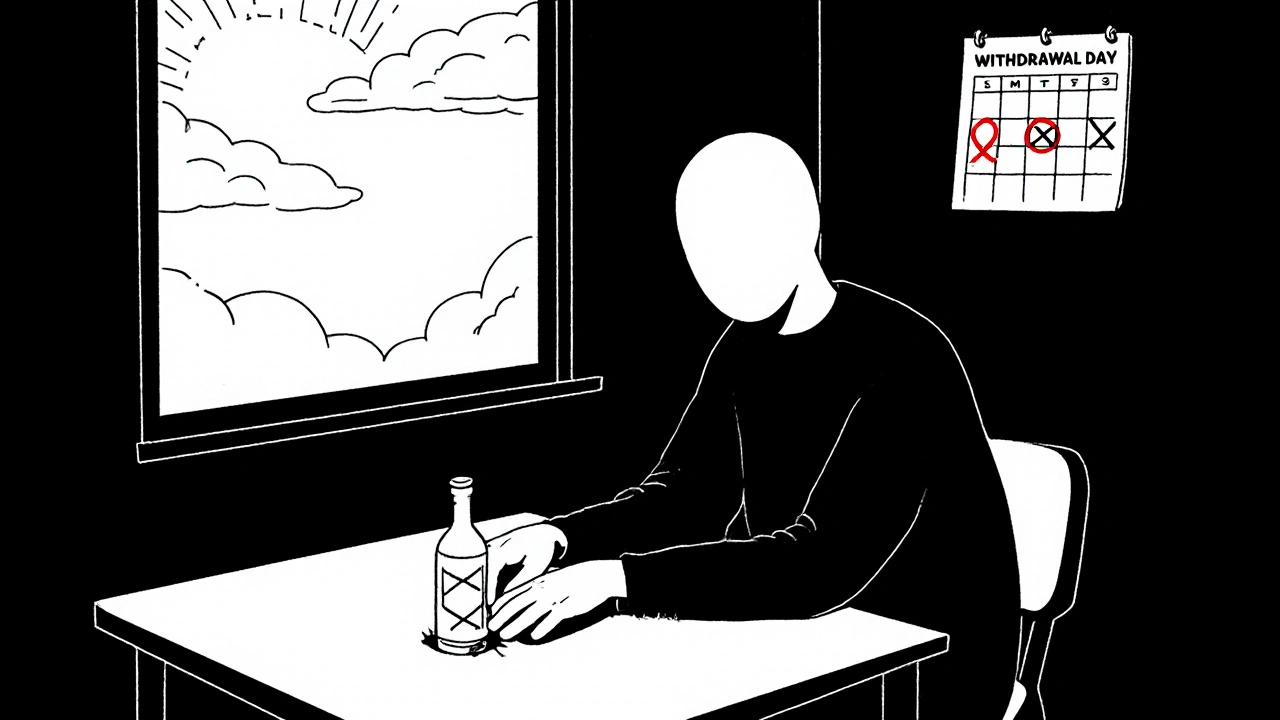
Psychological and Behavioral Signs
The physical symptoms are scary - but the mental ones can be harder to admit.
- You drink first thing in the morning to calm nerves or stop shaking.
- You hide bottles, lie about how much you drink, or drink alone.
- You’ve canceled plans, missed work, or gotten into fights because of alcohol.
- You keep promising to quit - but you can’t go more than a day or two without it.
- You feel anxious, irritable, or depressed when you’re not drinking - and drinking feels like the only fix.
These aren’t personality flaws. They’re survival behaviors. Your brain has learned that alcohol = safety. Without it, you feel unsafe. That’s the trap of dependence.
What Causes Alcohol Dependence?
No single cause. It’s a mix of biology, environment, and behavior.
Genetics play a big role. If a parent or sibling has alcohol dependence, your risk doubles. Scientists have identified over 50 genes linked to alcohol metabolism and reward pathways. Some people’s brains just respond more intensely to alcohol’s effects.
Early exposure matters. People who start drinking before age 15 are four times more likely to develop dependence than those who start after 21. The adolescent brain is still wiring itself - alcohol interferes with that process permanently.
Chronic stress is a major trigger. Trauma, job loss, grief, or loneliness can push someone toward alcohol as a coping tool. Over time, that tool becomes a crutch - then a requirement.
Access and culture matter too. In places where alcohol is cheap, widely available, and socially normalized, dependence rates rise. New Zealand has one of the highest per-capita alcohol consumption rates in the OECD. That doesn’t mean everyone drinks too much - but it does mean the risk is higher for vulnerable people.
How Is It Diagnosed?
Doctors use the DSM-5 criteria for alcohol use disorder. You don’t need to be ‘an alcoholic’ to qualify. If you’ve had at least two of these in the past year, it’s a diagnosis:
- Drinking more or longer than intended
- Wanting to cut down but can’t
- Spending a lot of time getting, using, or recovering from alcohol
- Cravings - strong urges to drink
- Failing to fulfill obligations at work, school, or home
- Continuing to drink despite relationship problems
- Giving up important activities because of alcohol
- Using alcohol in dangerous situations (like driving)
- Keeping drinking despite physical or mental health problems
- Needing more alcohol to get the same effect (tolerance)
- Experiencing withdrawal symptoms when not drinking
Two to three symptoms = mild. Four to five = moderate. Six or more = severe. Most people with dependence fall into the moderate to severe range.
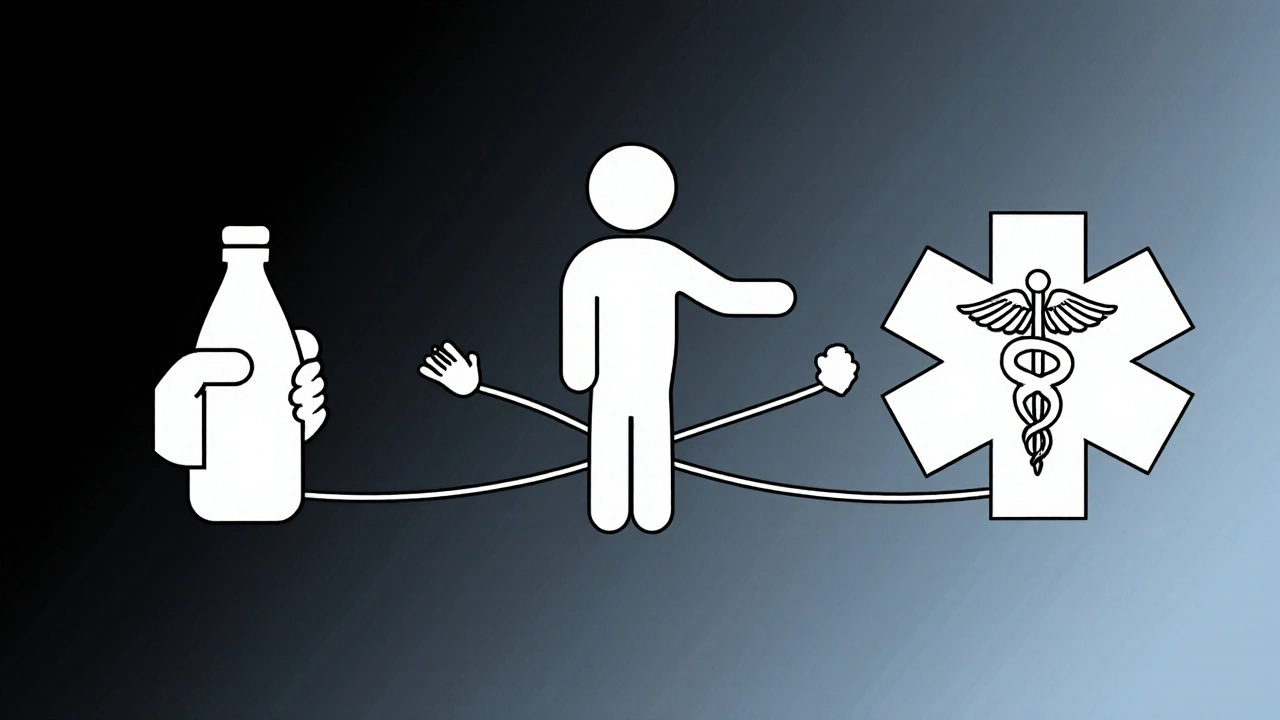
It’s Not Just About Willpower
People say, ‘Just stop.’ But if it were that easy, no one would die from DTs. Alcohol dependence isn’t a moral failure. It’s a neurological adaptation. Telling someone to ‘just quit’ is like telling someone with diabetes to ‘just stop being diabetic.’
Recovery isn’t about being strong enough. It’s about getting the right support. Medications like naltrexone or acamprosate can reduce cravings. Therapy helps rewire thought patterns. Support groups like Alcoholics Anonymous work because they replace isolation with connection - something the brain craves.
Recovery Is Possible - But It’s Not Linear
Many people relapse. That doesn’t mean failure. It means the disease is still active. Relapse rates for alcohol dependence are similar to asthma or hypertension - around 40-60% in the first year.
What changes outcomes? Early intervention. Medical supervision during withdrawal. Ongoing therapy. Social support. A plan that doesn’t rely on willpower alone.
Someone who quits cold turkey without help has a 10% success rate after one year. Someone who gets medical support and counseling? That jumps to 50-60%.
You don’t have to hit rock bottom to get help. You don’t have to be ‘ready.’ You just have to be willing to ask for it.
Where to Start
If you recognize these symptoms in yourself or someone else, here’s what to do:
- Speak to your doctor. Don’t wait. Withdrawal can be deadly without supervision.
- Call a helpline. In New Zealand, Alcohol Drug Helpline (0800 787 797) offers free, confidential support 24/7.
- Don’t try to quit alone if you’ve been drinking heavily for months or years.
- Find a support group. Peer connection saves lives.
- Be patient. Healing takes time - but it’s not impossible.
Alcohol dependence syndrome doesn’t define you. But ignoring it? That does.
Can you be dependent on alcohol without drinking every day?
Yes. Dependence isn’t about frequency - it’s about what happens when you don’t drink. Someone might drink heavily on weekends and go days without, but still experience tremors, anxiety, or cravings when they stop. That’s dependence. The body adapts to regular alcohol, even if it’s not daily.
Is alcohol dependence the same as alcoholism?
Yes, they’re the same condition. ‘Alcoholism’ is a lay term. ‘Alcohol dependence syndrome’ or ‘alcohol use disorder’ are the clinical names. The symptoms, causes, and treatments are identical. The change in terminology helps reduce stigma and focuses on the medical nature of the condition.
Can alcohol dependence be cured?
There’s no permanent ‘cure’ - but there’s full recovery. Once dependence develops, the brain’s chemistry changes. That change doesn’t vanish overnight. But with sustained abstinence, most brain functions improve significantly over 6-18 months. Many people live healthy, sober lives. Recovery isn’t about fixing a broken brain - it’s about giving it time to heal.
What’s the difference between tolerance and dependence?
Tolerance means you need more alcohol to feel the same effect. Dependence means your body physically needs alcohol to avoid withdrawal symptoms. You can have tolerance without dependence - like a weekend drinker who needs two drinks to feel buzzed. But dependence almost always includes tolerance. Dependence is the more serious stage.
Can withdrawal from alcohol be fatal?
Yes. Severe withdrawal, especially delirium tremens (DTs), can cause seizures, heart failure, or death. This is why quitting cold turkey after long-term heavy drinking is dangerous. Medical supervision during detox - with medications like benzodiazepines - can prevent these complications. Never try to quit alone if you’ve been drinking heavily for months or years.
How long does alcohol withdrawal last?
Acute withdrawal peaks within 24-72 hours and usually fades within a week. But some symptoms - anxiety, insomnia, cravings - can linger for weeks or months. This is called post-acute withdrawal syndrome (PAWS). It’s not a relapse - it’s your brain rebalancing. Support and time are key.
Does alcohol dependence run in families?
Yes. Genetics account for about half the risk. If a close relative has alcohol dependence, your chances increase significantly. But genetics aren’t destiny. Environment, trauma, mental health, and access to support play huge roles. You can have the genes and never develop dependence - or have none and still become dependent.
Can you become dependent after just a few months of drinking?
It’s possible - especially with heavy, frequent use. Someone drinking 6-8 drinks daily for 3-4 months can develop dependence. Age, mental health, and genetics influence how fast it happens. Young people and those with anxiety or depression are more vulnerable. It’s not about how long you’ve been drinking - it’s about how much and how often.
Are there medications to help with alcohol dependence?
Yes. Naltrexone blocks the pleasurable effects of alcohol. Acamprosate helps stabilize brain chemistry after quitting. Disulfiram causes unpleasant reactions if you drink. These aren’t magic pills - they work best with therapy and support. They’re proven to double your chances of staying sober.
What’s the best way to support someone with alcohol dependence?
Don’t judge. Don’t nag. Don’t enable. Do listen without trying to fix. Offer to help them find a doctor or call a helpline. Go to a support meeting with them if they’re open to it. Recovery is hard - but isolation makes it impossible. Your presence matters more than your advice.
Alcohol dependence syndrome doesn’t care who you are - your job, your income, your background. It only cares about how much and how often you drink. And if you’re reading this, wondering if it’s you - you’re already one step ahead. Help is here. You don’t have to face it alone.

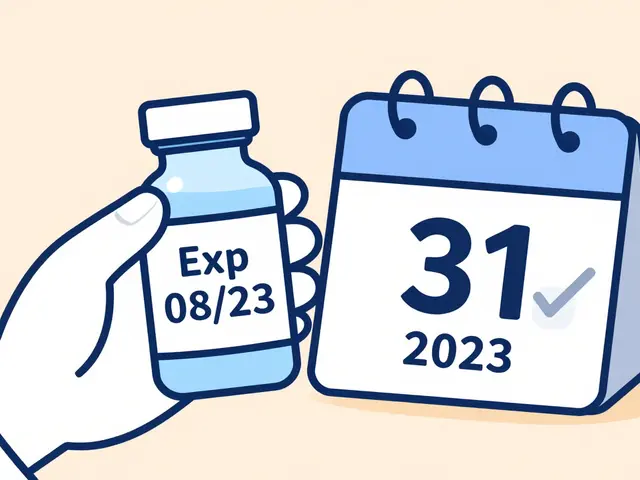
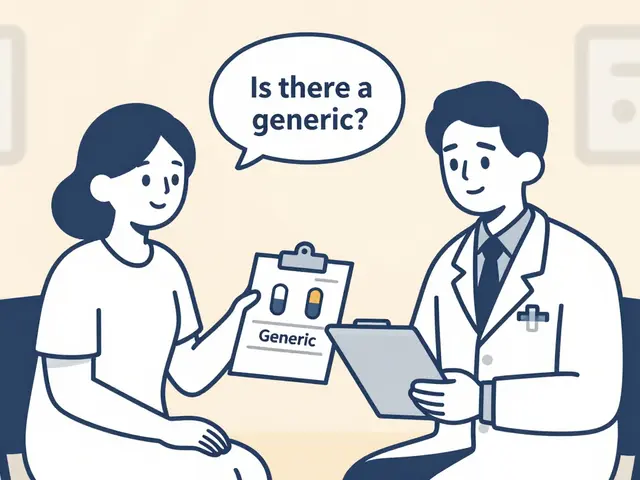

15 Comments
bro i used to chug 6 beers before bed just to sleep 😅 now my hands shake if i dont have a glass by 7am. its not a choice, my brain literally screams for it. thanks for explaining why it feels like my nervous system is on fire lol
Interesting breakdown. The GABA/glutamate imbalance is well-documented, but most people don’t realize the receptor downregulation can take over a year to partially reverse. Recovery isn’t about willpower-it’s neuroplasticity. And yes, tolerance ≠ dependence. One’s pharmacokinetic, the other’s neuroadaptive.
I’ve seen so many people think they’re ‘just a social drinker’ until they hit withdrawal. My cousin went from weekend wine to daily bottles in 8 months. When she tried to quit, she had night sweats so bad she soaked through three sets of pajamas. She’s been sober 14 months now-therapy, naltrexone, and a dog named Biscuit saved her. You don’t have to hit rock bottom. Just ask for help. 💪
You Americans treat addiction like some medical fairy tale. In India, we know alcohol is a weakness of the weak. If your brain can’t handle it, maybe you shouldn’t have started. No one forces you to drink. Stop making excuses and grow up.
I’ve been reading this and honestly? I think this whole ‘disease’ narrative is just Big Pharma’s way to sell meds. You don’t need naltrexone. You need discipline. My uncle drank for 30 years and quit cold turkey at 62. No help. No meds. Just grit. You’re all just scared to face the truth: it’s a moral failure
I appreciate how you broke this down without shaming. I used to think my anxiety at 3pm was ‘just stress’-turns out it was withdrawal from last night’s wine. I didn’t even realize I was dependent until I tried to skip a weekend and ended up crying in the grocery store. Help exists. You’re not broken. You’re just wired differently.
They don’t want you to know this but the WHO is funded by alcohol conglomerates. The ‘alcohol use disorder’ label? It’s a distraction. Real issue: corporate manipulation. They push alcohol like cigarettes did in the 50s. They even fund ‘recovery programs’ to make you think it’s fixable so you keep buying. Wake up.
The DSM-5 criteria are flawed. Tolerance and withdrawal are the only objective markers. Everything else is subjective. If you ‘lie about drinking’ or ‘cancel plans’-that’s behavioral, not medical. Don’t medicalize poor choices.
I had no idea about the 40% fewer GABA receptors stat. That’s wild. I thought it was just ‘bad habits’ but now I get why my friend couldn’t stop even after her liver started failing. It’s not her fault. It’s biology. I’m gonna send this to her.
There’s a quiet tragedy here: people don’t realize dependence isn’t about quantity-it’s about the absence of choice. The moment you drink to avoid the shakes, not to feel good, you’ve crossed a line. It’s not addiction to alcohol. It’s addiction to relief.
The medical community has pathologized normal human behavior. Alcohol dependence is not a syndrome. It is a failure of personal responsibility. I have seen too many patients use this as an excuse to avoid accountability. The brain adapts? So does the muscle. We don’t call weight gain a ‘syndrome’.
I cried reading this. My mom quit cold turkey last year and spent 3 weeks in the hospital with DTs. She’s sober now. But I wish someone had told us this BEFORE she almost died. This should be required reading in every high school. 🤍
The real tragedy isn’t the dependence-it’s the isolation. The shame. The silence. People don’t die from alcohol. They die from being alone with it. Connection is the antidote. Not just AA-any real human contact. A text. A walk. A meal. That’s the healing.
I used to think ‘just stop’ was enough. Then my brother tried it and had a seizure. Now I know: you don’t fix a broken brain with pep talks. You fix it with medicine, time, and people who show up-even when it’s ugly. I’m proud of him. He’s not weak. He’s brave.
This is all a scam. The government wants you dependent so you need therapy and meds. Then they tax the meds. Then they profit. The real cure? Stop drinking. No doctor. No AA. Just quit. I did it in 1998. You can too. Stop listening to the lies.